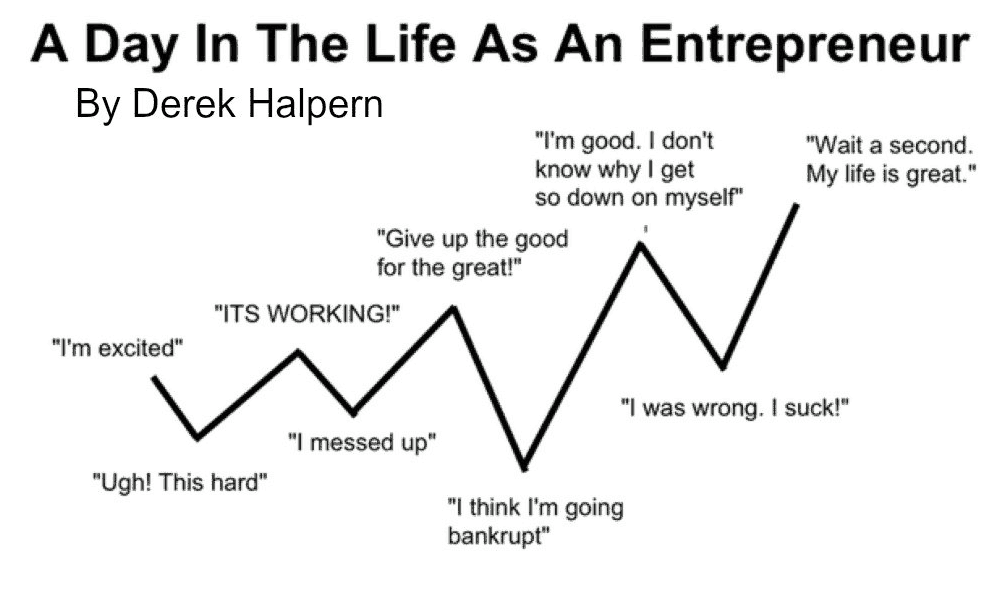🖊 This article was last updated on May 31, 2023
If you were to ask a room full of entrepreneurs, “What’s the key trait of successful entrepreneurs?” Among the common responses of passion, creativity, and competitiveness, you’ll also hear a number of variations of determination and resilience. That ability to just ‘keep going’ no matter what, is seen as a positive, must-have quality for success.
In fact, this concept of “stay strong and never give up!” could be a one-way ticket to failure. You’ve heard the saying ‘quit while you’re ahead’… Well, sometimes you have to quit when you’re behind too.
I’m going to explain why the art of quitting is a winning business strategy.
News flash: Quitting isn’t failure
We are taught to just ‘knuckle down’ and ‘weather the storm’. But, what if you are headed in the wrong direction? What if your idea isn’t possible? What if your business is a lost cause?
Isn’t it better to just…quit?
Quitting has a bit of a bad rep, but in business, it can be a pretty smart move. Quitting has become synonymous with ‘failure’ but if you look up the verb ‘to quit’ in the dictionary, one of the meanings is ‘to set free’. The act of quitting can actually free you from impending failure.
There’s no need to go down with the ship

Success can be elusive for many reasons, especially in today’s volatile economy and determination is needed to drive your business forward. But sometimes what passes for determination is just pride and pig-headed stubbornness tied up in a fancy bow.
When we have a business idea, we get excited, convinced it’s the most genius thing ever and if we just work hard enough, or throw enough hours and money at it, then we can change the world. Other times, we’re just too proud to actually admit that our baby isn’t that smart…
A savvy entrepreneur will see the futility of trying to bail out a sinking ship and take action to salvage what they can before pulling the plug and moving on.
But, winners don’t quit?
Oh yes they do! Some of the most successful companies started down a completely different path than the one that made them successful.
- YouTube started as a dating site
- Slack started as a video game (Glitch)
- Groupon started as a social platform (The Point)
- Shopify started as an online snowboard equipment store (Snowdevil)
- Twitter started as a podcast company (Odeo)
- Starbucks started as a store selling espresso makers and coffee beans
- Nokia started out as a paper mill
- Flickr started out as an RPG aka online Role-Playing Game (Neverending)
- Suzuki started out as a producer of weaving loom machines
These businesses, now leaders in their respective fields, started out in one direction, realised it wasn’t working, and they pivoted. They QUIT and it was the best business decision they ever made.
Can you imagine if YouTube had never pivoted? You’d all be watching lonely-hearts adverts instead of endless hours of cat videos!
All joking aside, YouTube is now estimated to be worth more than $100 billion… And they say quitters never win, huh?
Constructive quittism
Ok, not a real word, but the decision of WHEN to quit is just as important as giving yourself the permission to quit. Does this mean you just throw in the towel when things get tough? No.
Starting your own business, being your own boss is tough and you are going to have ups and downs, (plenty of downs). But, if you are on the right path then all of the hardships will be worth it, one day. Eventually.

If you are on the wrong path, then those hardships will never ease up and success will get further and further away. It’s a simple case of time management— the more time you spend on a sinking ship, is less time spent on success.
As Eric Barker, author of Barking Up the Wrong Tree, says:
If you never quit anything, you’re going to have less time for the things that really matter.
Eric Barker
Seth Godin also states that winners know that time, money, and energy are limited resources and quitting is actually essential in order to take advantage of better business opportunities.
Knowing when to quit

The key strategy which separates successful entrepreneurs from unsuccessful entrepreneurs, is the ability to know when to quit.
Life as an entrepreneur is all about making difficult decisions, and the decision to quit can be one of the hardest you’ll ever have to make.
But, how do you know when it’s just normal level hard, or when it’s just sinking-ship pointless? The three main reasons to quit your business according to smart business quitter, Julie Wilson, (once owner and publisher of Story Magazine) are when:
- You no longer recognise yourself
- You can’t cope
- The passion is gone
So much (too much?) attention is given to teaching inspiring entrepreneurs how to start businesses and too little instruction on how to end them. But, having a safe exit strategy for your business is imperative.
Knowing when to quit is crucial but you can figure it out… Weigh up your business goals, research and gather information, explore alternatives, and assess your options.
Then ask yourself, is it time to quit?
Conclusion
We have to shake off this dirty stigma of quitting. It is an entrepreneurial survival strategy, a smart, tactical move that is a sorely underrated skill.
What IS failure, is continuing down the wrong path despite everything around going up in flames and expecting the right result.

We have to start taking quitting seriously as a strategic business process. Quitters are not, as Paul G. Stoltz claims, “the dead weight of any organization”. Quitters are the movers and the shakers of the business world. They are the ones who are not afraid to take risks, to try something new, to throw away the shackles of conformity.
Quitters prove that they can think systematically and do what needs to be done.
Be bold, be brave. And quit!
- These Black Friday deals will skyrocket your productivity (2021 edition) - November 11, 2021
- How to Stay Productive as a Digital Nomad - December 23, 2019
- When is the right time to outsource? - December 3, 2019

